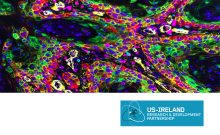
Queen’s University Belfast has been successful in a £4.6m tripartite grant award to tackle colorectal cancer. The prestigious US-Ireland partnership award provides a unique opportunity to bring together leading researchers from Queen’s University, the Royal College of Surgeons in Ireland (RCSI) and GE Healthcare in the US in an interdisciplinary programme of research to develop new approaches to diagnose and treat the deadly disease.
The project is funded by the US National Institutes of Health, the Health and Social Care Research and Development (HSC R&D) Division of the Public Health Agency Northern Ireland, the Medical Research Council, Science Foundation Ireland and the Health Research Board of Ireland.
Please see the QUB website for the full press release>>
Colorectal cancer is the third most common cancer worldwide and it is predicted that the number of cases will rise to 2.4 million diagnosed per year by 2035. There are a number of treatment options available to colorectal cancer patients and a patient’s response to treatment will depend on the specific type or makeup of the cancer. As a ‘one-size-fits-all’ treatment approach does not work for all patients, a more precise understanding of what happens inside colorectal cancer cells is required. This study will involve the examination of thousands of tumour samples in a bid to develop a diagnostic test that will enable more precise treatment plans for individual patients.
Using MutliOmyx, the state-of-the-art technology developed by GE Healthcare, and together with RCSI’s expertise in Systems Medicine, Queen’s researchers will comprehensively characterise the gene and protein interactions inside colorectal cancer cells and use this information to select or stratify patients for particular therapeutic interventions.
Professor Mark Lawler, Chair in Translational Genomics at Queen’s University explains: “Inside the colorectal cancer cell is like a massive series of circuits that are switched on all the time, but different subsets of patients have subtle changes in their circuitry. The MultiOmyx technology is essentially like a highly sophisticated 'molecular camera,' allowing us to take multiple 'snapshots' inside the colorectal cancer cell, defining a particular circuitry (a molecular signature) that identifies the patient’s colorectal cancer subtype. This will allow us to match the right patient to the right treatment.”
The research could also lead to improvements in treatment for colorectal cancer, namely immunotherapy, a powerful new approach that has shown to be effective in treating a number of other cancers. Professor Dan Longley from Queen’s University explains: “Being able to analyse particular cell types, for example immune cells in tumour tissues, could pave the way for immunotherapy for this type of cancer which could have long-lasting benefits for colorectal cancer patients. Although we are focussed on colorectal cancer, this technology can be applied to any cancer.”
Professor Ian Young, Director of HSC R&D said: “The HSC R&D Division in the Public Health Agency, with support from the Medical Research Council is pleased to be funding this high quality research study. We expect that the outcomes from this international research will lead to significant advances in the treatment of patients with colorectal cancer in the UK, Ireland and globally.”

